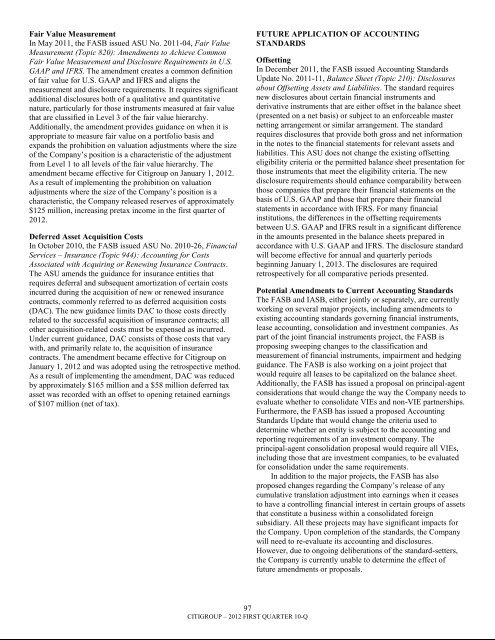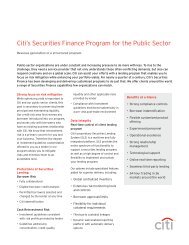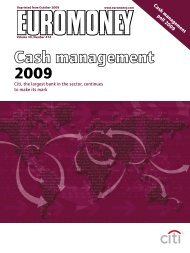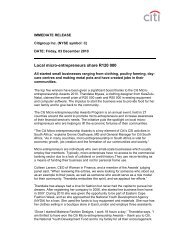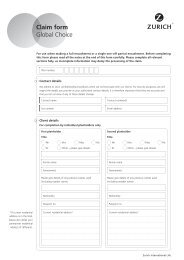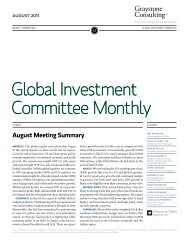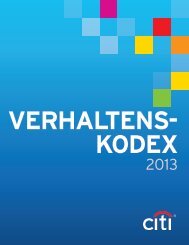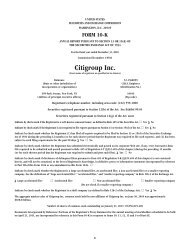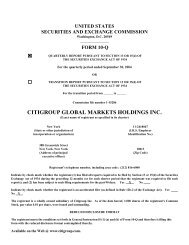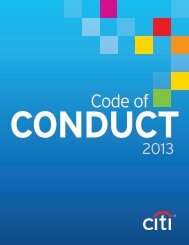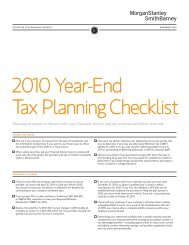7.3 billion - Citigroup
7.3 billion - Citigroup
7.3 billion - Citigroup
Create successful ePaper yourself
Turn your PDF publications into a flip-book with our unique Google optimized e-Paper software.
Fair Value MeasurementIn May 2011, the FASB issued ASU No. 2011-04, Fair ValueMeasurement (Topic 820): Amendments to Achieve CommonFair Value Measurement and Disclosure Requirements in U.S.GAAP and IFRS. The amendment creates a common definitionof fair value for U.S. GAAP and IFRS and aligns themeasurement and disclosure requirements. It requires significantadditional disclosures both of a qualitative and quantitativenature, particularly for those instruments measured at fair valuethat are classified in Level 3 of the fair value hierarchy.Additionally, the amendment provides guidance on when it isappropriate to measure fair value on a portfolio basis andexpands the prohibition on valuation adjustments where the sizeof the Company‘s position is a characteristic of the adjustmentfrom Level 1 to all levels of the fair value hierarchy. Theamendment became effective for <strong>Citigroup</strong> on January 1, 2012.As a result of implementing the prohibition on valuationadjustments where the size of the Company‘s position is acharacteristic, the Company released reserves of approximately$125 million, increasing pretax income in the first quarter of2012.Deferred Asset Acquisition CostsIn October 2010, the FASB issued ASU No. 2010-26, FinancialServices – Insurance (Topic 944): Accounting for CostsAssociated with Acquiring or Renewing Insurance Contracts.The ASU amends the guidance for insurance entities thatrequires deferral and subsequent amortization of certain costsincurred during the acquisition of new or renewed insurancecontracts, commonly referred to as deferred acquisition costs(DAC). The new guidance limits DAC to those costs directlyrelated to the successful acquisition of insurance contracts; allother acquisition-related costs must be expensed as incurred.Under current guidance, DAC consists of those costs that varywith, and primarily relate to, the acquisition of insurancecontracts. The amendment became effective for <strong>Citigroup</strong> onJanuary 1, 2012 and was adopted using the retrospective method.As a result of implementing the amendment, DAC was reducedby approximately $165 million and a $58 million deferred taxasset was recorded with an offset to opening retained earningsof $107 million (net of tax).FUTURE APPLICATION OF ACCOUNTINGSTANDARDSOffsettingIn December 2011, the FASB issued Accounting StandardsUpdate No. 2011-11, Balance Sheet (Topic 210): Disclosuresabout Offsetting Assets and Liabilities. The standard requiresnew disclosures about certain financial instruments andderivative instruments that are either offset in the balance sheet(presented on a net basis) or subject to an enforceable masternetting arrangement or similar arrangement. The standardrequires disclosures that provide both gross and net informationin the notes to the financial statements for relevant assets andliabilities. This ASU does not change the existing offsettingeligibility criteria or the permitted balance sheet presentation forthose instruments that meet the eligibility criteria. The newdisclosure requirements should enhance comparability betweenthose companies that prepare their financial statements on thebasis of U.S. GAAP and those that prepare their financialstatements in accordance with IFRS. For many financialinstitutions, the differences in the offsetting requirementsbetween U.S. GAAP and IFRS result in a significant differencein the amounts presented in the balance sheets prepared inaccordance with U.S. GAAP and IFRS. The disclosure standardwill become effective for annual and quarterly periodsbeginning January 1, 2013. The disclosures are requiredretrospectively for all comparative periods presented.Potential Amendments to Current Accounting StandardsThe FASB and IASB, either jointly or separately, are currentlyworking on several major projects, including amendments toexisting accounting standards governing financial instruments,lease accounting, consolidation and investment companies. Aspart of the joint financial instruments project, the FASB isproposing sweeping changes to the classification andmeasurement of financial instruments, impairment and hedgingguidance. The FASB is also working on a joint project thatwould require all leases to be capitalized on the balance sheet.Additionally, the FASB has issued a proposal on principal-agentconsiderations that would change the way the Company needs toevaluate whether to consolidate VIEs and non-VIE partnerships.Furthermore, the FASB has issued a proposed AccountingStandards Update that would change the criteria used todetermine whether an entity is subject to the accounting andreporting requirements of an investment company. Theprincipal-agent consolidation proposal would require all VIEs,including those that are investment companies, to be evaluatedfor consolidation under the same requirements.In addition to the major projects, the FASB has alsoproposed changes regarding the Company‘s release of anycumulative translation adjustment into earnings when it ceasesto have a controlling financial interest in certain groups of assetsthat constitute a business within a consolidated foreignsubsidiary. All these projects may have significant impacts forthe Company. Upon completion of the standards, the Companywill need to re-evaluate its accounting and disclosures.However, due to ongoing deliberations of the standard-setters,the Company is currently unable to determine the effect offuture amendments or proposals.97CITIGROUP – 2012 FIRST QUARTER 10-Q


